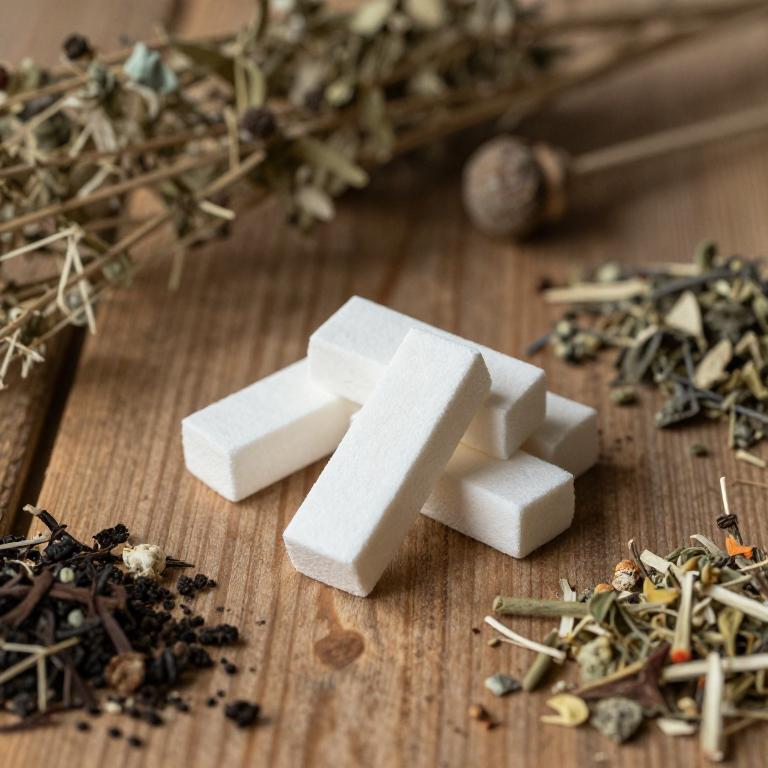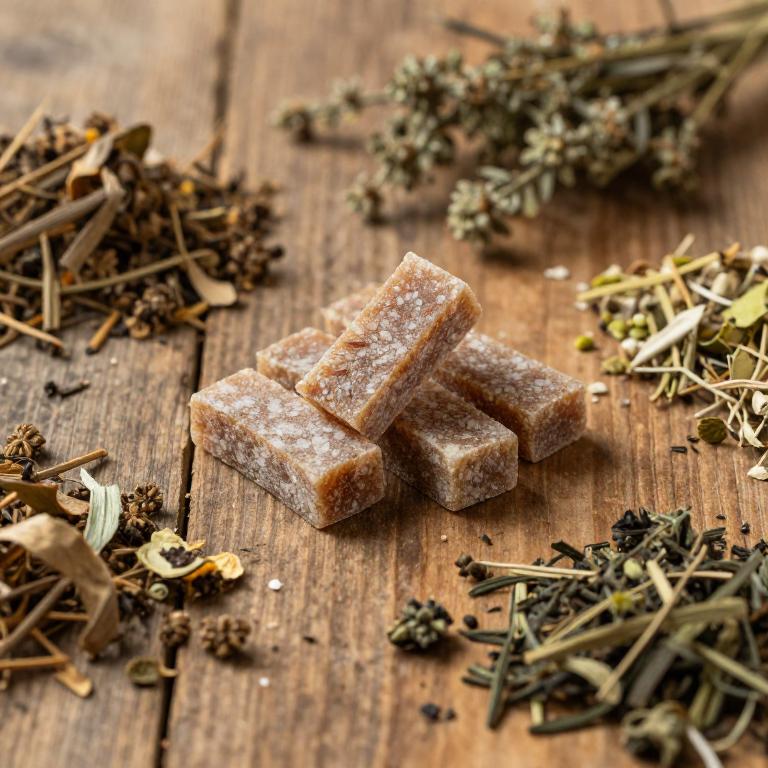10 Best Herbal Lozenges For Infection

Herbal lozenges are natural remedies that combine various plant-based ingredients to soothe sore throats and support the body's fight against infections.
These lozenges often contain herbs such as echinacea, sage, licorice root, and ginger, which are known for their antimicrobial and anti-inflammatory properties. They can help reduce symptoms of respiratory infections by alleviating irritation and boosting immune response. While they are generally safe for most people, individuals with allergies or specific health conditions should consult a healthcare provider before use.
Herbal lozenges are a popular alternative to conventional medications, offering a gentler approach to managing mild infections.
Table of Contents
- 1. Salvia (Salvia officinalis)
- 2. Ginger (Zingiber officinale)
- 3. Thyme (Thymus vulgaris)
- 4. Echinacea (Echinacea purpurea)
- 5. Licorice (Glycyrrhiza glabra)
- 6. Camellia (Camellia sinensis)
- 7. Ceylon cinnamon (Cinnamomum verum)
- 8. Peppermint (Mentha piperita)
- 9. Fennel (Foeniculum vulgare)
- 10. Black elderberry (Sambucus nigra)
1. Salvia (Salvia officinalis)

Salvia officinalis, commonly known as sage, has been traditionally used for its antimicrobial and anti-inflammatory properties, making it a valuable ingredient in herbal lozenges for treating infections.
These lozenges often contain a blend of sage extract, which may help reduce symptoms of respiratory infections such as sore throat and cough by inhibiting the growth of harmful bacteria and viruses. The essential oils in sage, including thujone and camphor, contribute to its expectorant and decongestant effects, providing relief from congestion and promoting easier breathing. Due to its natural antiseptic qualities, sage lozenges are often recommended as a supportive treatment for mild to moderate infections, especially in individuals seeking natural remedies.
However, it is important to consult a healthcare professional before using sage lozenges, especially for prolonged periods or in combination with other medications.
2. Ginger (Zingiber officinale)

Zingiber officinale, commonly known as ginger, has been traditionally used for its medicinal properties, including its ability to alleviate symptoms of infections.
Ginger contains bioactive compounds such as gingerols and shogaols, which possess antimicrobial and anti-inflammatory effects. Herbal lozenges made from zingiber officinale can help soothe sore throats and reduce inflammation associated with respiratory infections. These lozenges are often used as a natural remedy to support the body's immune response during colds or flu.
However, while ginger may provide symptomatic relief, it should not replace conventional medical treatment for serious infections.
3. Thyme (Thymus vulgaris)

Thymus vulgaris, commonly known as thyme, is a herb widely used in traditional medicine for its antimicrobial and immune-boosting properties.
Thymus vulgaris herbal lozenges are formulated to support the body's natural defenses against infections, particularly respiratory tract infections such as colds and sore throats. These lozenges contain thymol, a powerful essential oil with potent antiseptic and antifungal qualities that help combat harmful bacteria and viruses. The soothing effect of the lozenges also provides relief from throat irritation and discomfort associated with infections.
Regular use of thymus vulgaris lozenges may enhance immune function and reduce the duration and severity of infectious symptoms.
4. Echinacea (Echinacea purpurea)

Echinacea purpurea herbal lozenges are commonly used to support the immune system and may help reduce the duration and severity of colds and other upper respiratory infections.
These lozenges contain extracts from the purple coneflower, which is known for its antimicrobial and anti-inflammatory properties. Some studies suggest that echinacea can enhance immune response by stimulating the production of white blood cells and reducing viral replication. However, the effectiveness of echinacea may vary depending on the specific formulation and preparation method.
As a complementary therapy, echinacea lozenges should be used alongside standard medical care and under the guidance of a healthcare professional.
5. Licorice (Glycyrrhiza glabra)

Glycyrrhiza glabra, commonly known as licorice root, is a traditional herbal remedy that has been used for centuries to support respiratory health.
Glycyrrhiza glabra herbal lozenges are formulated to soothe sore throats and reduce inflammation in the mucous membranes, making them effective for managing symptoms of infections such as colds, flu, and bronchitis. The active compounds in licorice root, including glycyrrhizin and flavonoids, exhibit antimicrobial and anti-inflammatory properties that may help combat viral and bacterial infections. These lozenges are often preferred for their pleasant taste and ease of use, allowing for targeted relief without the need for systemic medication.
However, long-term use should be monitored due to potential side effects related to corticosteroid-like effects of glycyrrhizin.
6. Camellia (Camellia sinensis)

Camellia sinensis herbal lozenges are made from the leaves of the Camellia sinensis plant, which is the primary source of both green and black tea.
These lozenges are often used for their potential antimicrobial and anti-inflammatory properties, which may help in supporting the body’s natural defenses against infections. The active compounds in Camellia sinensis, such as catechins and polyphenols, are believed to contribute to their therapeutic effects. While they are not a substitute for medical treatment, these lozenges may offer some relief for mild throat irritation or respiratory symptoms associated with infections.
As with any herbal remedy, it is advisable to consult a healthcare professional before use, especially for individuals with underlying health conditions or those taking other medications.
7. Ceylon cinnamon (Cinnamomum verum)

Cinnamomum verum, also known as true cinnamon, contains essential oils and compounds such as cinnamaldehyde and eugenol, which have antimicrobial and anti-inflammatory properties.
Herbal lozenges made from Cinnamomum verum are often used to soothe sore throats and reduce symptoms of upper respiratory infections. These lozenges work by creating a protective barrier over the mucous membranes in the throat, helping to alleviate irritation and discomfort. The warming effect of cinnamon can also help to ease congestion and promote easier breathing.
While they are not a substitute for medical treatment, Cinnamomum verum lozenges may provide natural relief for mild infections and support the body's natural healing process.
8. Peppermint (Mentha piperita)

Mentha piperita, commonly known as peppermint, is often used in herbal lozenges to help alleviate symptoms of throat infections due to its soothing and cooling properties.
These lozenges can help reduce inflammation and irritation in the throat, making them a popular choice for individuals suffering from sore throats or viral infections. The menthol in peppermint provides a mild numbing effect, which can ease discomfort and promote easier breathing. Additionally, peppermint has antimicrobial properties that may help in reducing the presence of harmful bacteria in the throat.
When used as part of a holistic approach to treatment, peppermint lozenges can complement other remedies and support the body’s natural healing process.
9. Fennel (Foeniculum vulgare)

Foeniculum vulgare, commonly known as fennel, is a herbal remedy often used in the form of lozenges to help alleviate symptoms of respiratory infections.
These lozenges are typically made from the dried seeds of the fennel plant and are valued for their antiseptic and anti-inflammatory properties. Fennel lozenges may help reduce coughing, soothe sore throats, and ease congestion by promoting expectoration and reducing irritation in the respiratory tract. They are often used as a natural alternative to conventional cough medications, especially in children and adults seeking herbal treatments.
However, it is important to consult with a healthcare professional before using fennel lozenges, particularly for individuals with allergies or those taking other medications.
10. Black elderberry (Sambucus nigra)

Sambucus nigra, commonly known as the European elderberry, is often used in herbal lozenges to support the immune system and alleviate symptoms of respiratory infections.
These lozenges are typically made from dried elderberries, which are rich in antioxidants, flavonoids, and vitamin C, all of which may help reduce the duration and severity of colds and flu. The natural compounds in elderberries are believed to inhibit viral replication, making them a popular choice for those seeking natural remedies for infections. While generally considered safe when consumed in moderate amounts, it is important to note that raw or unripe elderberries can be toxic, so only properly processed lozenges should be used.
As with any herbal supplement, it is advisable to consult a healthcare professional before use, especially for individuals with chronic health conditions or those taking other medications.